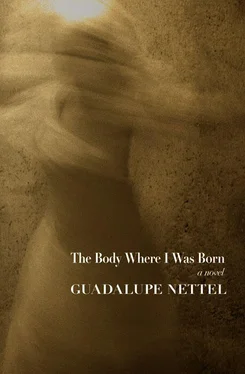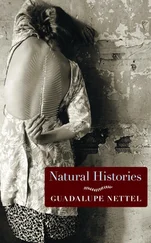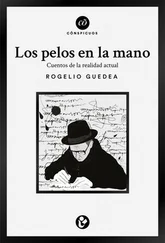That night marked the beginning of a tradition: when the lights in each of our apartments went out, she and I would have our meeting. The ritual was to stand facing each other, and thus to keep the other company until sleep overcame us. We never communicated through any orthodox means, neither there nor anywhere else, but, consciously or unconsciously, Ximena made me feel that despite my parents’ absence, and my absolute uncertainty about what was to come, I had someone in this world I could count on. Think what you want, Dr. Sazlavski, I’m convinced — and now, more than ever — that this communication happened and was so profound that it surpassed spatial and temporal limits, as often occurs between the closest people. What I knew about her wasn’t a lot, but it was enough to give me some idea of her emotions. I knew, as I mentioned before, that she was Chilean and had lived in that building with her mother and sister since coming to Mexico. Pinochet’s men had riddled her father with bullets before he could get out of Santiago. In contrast to Paula, her younger sister, who was blond with light-eyes and a light-hearted nature, Ximena was taciturn. Her hair and expression were dark and so too were her thoughts, probably. Maybe she was thinking nostalgically about the days peace reigned in her country, about her family and all the happy memories she stored in her soul. She almost never went out to the plaza, and when she did it wasn’t to join in the games with the other kids. She liked to sit under the tree near the parking lot, same as me, but instead of climbing the branches, she remained with the stones and roots. Ximena did oil paintings. I had seen her a few times staring at her easel in that bedroom half revealed to me through the limited reach of my binoculars. What was her relationship with her family like? What school did she go to and how did she get along with her classmates? These and a dozen other questions struck me at night as I watched her from my room. I also liked to find similarities between us, beyond the placement of our windows, like the color of our hair and the fact that childhood was not a bed of roses for either one of us.
One afternoon when I was particularly sad and in urgent need of meeting Ximena, I appeared at the window before it was time, to see if by chance I could get a glimpse of her through her bedroom curtains, even just a fleeting one. I saw there was a fire in her apartment. I flung open my bedroom door and shouted to my grandmother to call the fire department. I remember that I went running into the street and up onto the mound with the tree and waited for the firemen to arrive. It was then I realized: the image was not a picture of normal burning with fire coming out of the windows, but a much more subtle spectacle. The flames formed a silhouette like a tree of light. After an unbearably long time, we heard the sirens and, with them, we saw the fire truck appear. An ambulance also came to take Ximena out on a stretcher. We later found out, from some neighbors in her building, that she had bathed in oil paint solvent and started a fire in her bedroom. The news was in all the papers. Someone uttered the word “schizophrenic.” For me, the explanation was simple: Ximena had resolved to escape once and for all the cage of her life.
Never again would she keep me company from her bedroom. But the coincidences did not end with her death. Many years later, after my first books were published, I was invited to join a panel of judges for a short story contest the Chilean journal Paula organizes every year. I visited Santiago on a whirlwind trip filled with activities. Traveling the streets of this city, I thought of some of the kids who had shared part of my childhood. Had they returned to their countries with the arrival of democracy? And, if so, would they recognize themselves in these renovated and shiny streets, where years earlier their families had been persecuted? I thought of Ximena, of course, and also of a few others with tragic stories like Javiera Enríquez, whom I met later as a teenager, and who had lost her family when she was four years old. The one morning I had off, I asked to visit Pablo Neruda’s home in Isla Negra, an hour from the capital. Along with my ten-month-old son, I was accompanied by Silvia Ossandón, an editor from the magazine, whom I had become friends with. We were met by the person in charge of public relations for la Casa Neruda, a man who had lived in exile in Mexico and who immediately took a liking to me. His name was Bernardo Baltiansky. We spoke a little bit before my tour through the museum house. We discovered that in the eighties we had lived in the same neighborhood. As I looked at the innumerable collections of the late author of I Confess I Have Lived , at all the remnants of his time on earth, I had only one thing on my mind, Ximena. When I left I was going to ask this man if he had known her, if he could tell me something about her — any piece of information, any fact that would bring me closer to her would satisfy me. I needed to find a way to bring up the subject. While thinking about it, Bernardo told me that in his lifetime Neruda had written, traveled, carried out diplomatic duties, been married several times, and above all had built houses and furniture, a colossal oeuvre. Ximena in turn had passed through the world on feet unsure and slippery. Her time here had been short, but resplendent for those of us lucky enough to have seen her.
At the end of the tour, Bernardo invited us to have a drink in the museum café. The ocean waves lapped the sand a few meters away. It seemed like the water’s smooth persistence whispered secrets from the not too distant past when Chile’s coast had seen the most terrible atrocities, secrets no one was ready to hear, as if what those people most feared was waking the ghosts of the disappeared. Silvia reminded me that if we wanted to find an open restaurant we should leave soon. I asked Bernardo if he had known other Chileans in Villa Olímpica. As if he had expected the question, he answered yes, his sister had also lived there with her daughters.
“My niece committed suicide in one of those buildings,” he said.
Inside my body, I felt my blood turn as cold as the waves of the cobalt sea.
“What was her name?” I asked, knowing it could be no one else. Bernardo confirmed it. He also told me that some months before her death his niece had been diagnosed with schizophrenia, an illness that served to encompass all the unclassifiable disorders, and which also happened to be the diagnosis for Javiera Enríquez. Bernardo spoke of her without telling me anything I didn’t already know. Until he started talking about her painting.
“She was very talented. The best painting she did is still in my sister’s house. It’s of an immense tree that grew in Villa Olímpica, just in front of her house, where she spent many hours.”
“And your sister?” I asked, “does she still live there?”
“No, she lives in Santiago. If you’d like, we can call her.”
That evening I had promised to have dinner at my writer friend Alejandro Zambra’s house. When I got there, I told him the story and asked him to go with me to the woman’s apartment. It wasn’t far from where he lived and he readily agreed. As soon as Ximena’s mother opened the door, I saw the painting on the main wall of her living room. It had a power of attraction, like a face with a strong magnetism. At least that’s the effect it had on me. It really was a portrait of our tree, if trees can belong to people. On the volcanic rocks there were silhouettes of children sitting in front of one another and back-to-back, children whose faces couldn’t clearly be made out, pensive children who played neither together nor alone. Children like we had been. The painting moved me to tears. All of a sudden, that feeling of abandonment, a constant in those years, came back to life; but so too did the composure I had always maintained, in those days when letting others see me cry was the last thing I’d do. Habits we develop in childhood stay with us forever, and even though we are able by force of great will to keep them at bay, crouching in a sinister place in our memory, when we least expect them they leap into our faces like enraged cats. I focused on the other paintings Ximena’s mother was showing me and politely answered the questions she asked. It wasn’t a long conversation. I believe that neither of us was ready to open the floodgate of emotions for the fear of the torrents that would wash over us; our feelings were only exposed at their tips like icebergs moving beneath the surface. Even though it was my day off, I was on a work trip and didn’t want to enter into the vulnerable space that encroaches every time I invoke with words all those memories, a space from which it takes me several days to climb out. Nor did I want to hurt her or to put her in a similar state. In that house, Alejandro and I drank tea, spoke about literature, and let my son play with a Moroccan drum. I found out that Paula, her other daughter, had also returned to Santiago, had become a mother like me, and was a fan of Manu Chao. Then we left, leaving behind no trace but a forgotten pacifier.
Читать дальше












